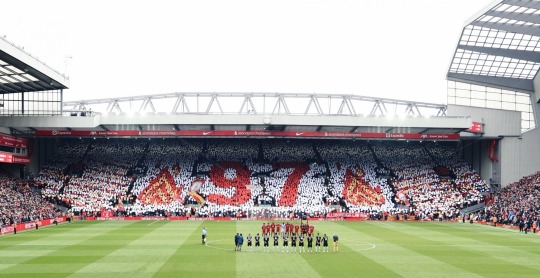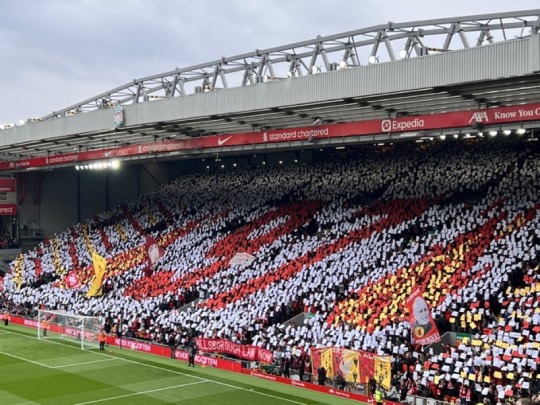#jft97
Text
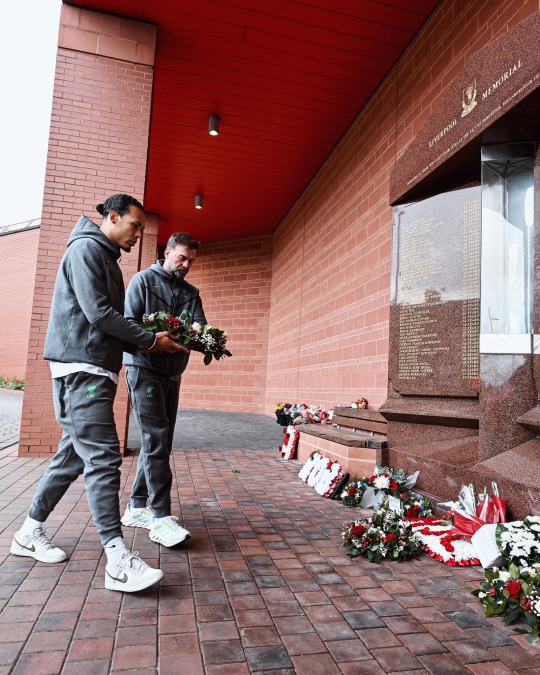
Virgil and Klopp remembering the 97 Liverpool fans who lost their life 35 years ago today 🌹
161 notes
·
View notes
Text
on april 15th not only do we remember the victims on hillsborough, we also remember everyone who indirectly lost their lives because of hillsborough, we remember everyone who has to live with that guilt and trauma.
we remember individuals like stephen whittle, who lost their lives to the guilt and grief of hillsborough, we remember the individuals who took their lives after paris as they re-lived their traumas, we remember the individuals who died before they ever got to see an unlawfully killing verdict, we remember those who have taken their lives, not wanting to face another anniversary, we remember those who died fighting for justice, we remember those who lived that day and wished they didn't, we remember the victims families and friends who are subjected to discriminative chants.
not only do we remember the 97 and these people on the 15th, but we remember them every other day, and we will continue to fight for justice for them, we will continue to fight until everyone responsible for this disaster is held accountable.
338 notes
·
View notes
Text
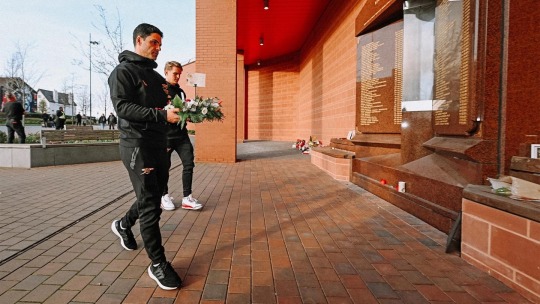


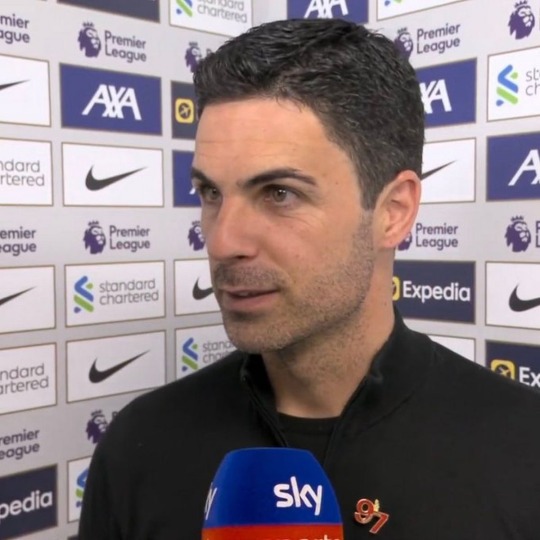
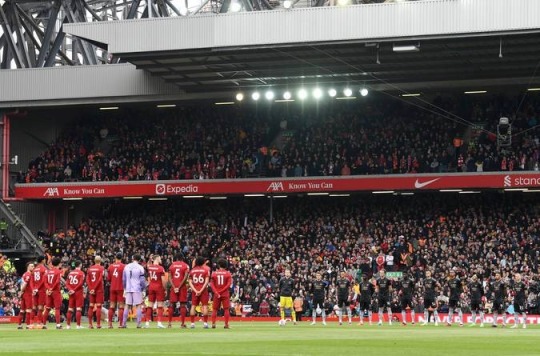
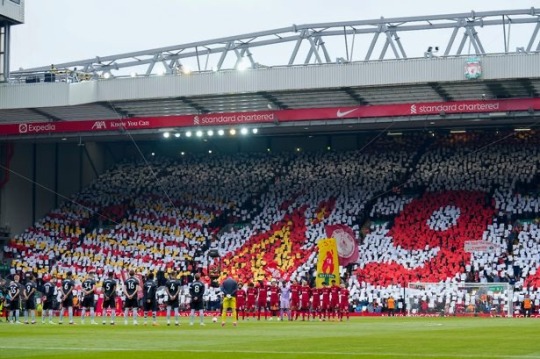
Arsenal’s manager, captain, players, staff, and fans showed so much class on Sunday. Huge respect to them❤️JFT97
82 notes
·
View notes
Text
writing essays on Hillsborough always makes me so sad man, how are you allowing 3,000 people into two pens that were only able to hold 929 people altogether? like how? how incompetent do you need to be? not only that, the fucking stadium didn’t even have an updated safety certificate at the time of the disaster, the fact that this was so easily overlooked by the authorities is a joke
11 notes
·
View notes
Text
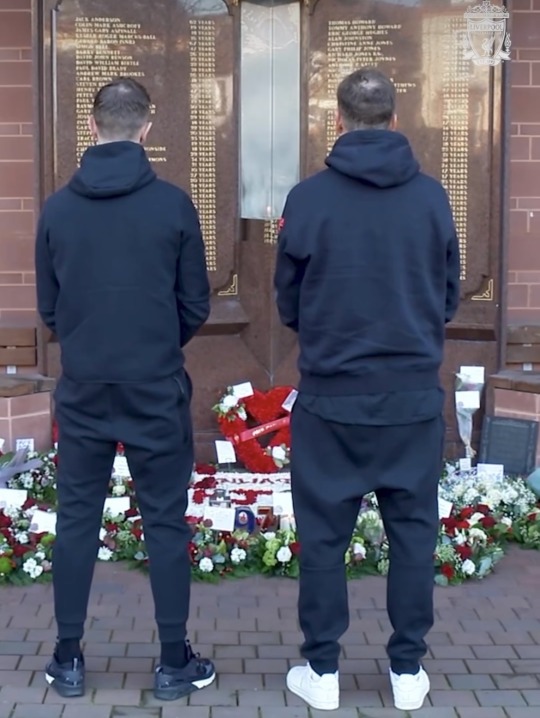
Hendo and Klopp looking similar from the back
40 notes
·
View notes
Text
Liverpoool! Liverpoooooooool!


We’re the best football team in the land, yes we are!!!! 🔴🔴🔴🔴🔴🔴🔴🔴🔴🔴🔴🔴🔴🔴🔴🔴🔴🔴🔴🔴🔴🔴🔴🔴🔴🔴🔴🔴🔴🔴🔴🔴🔴🔴🔴🔴🔴🔴🔴🔴🔴🔴🔴🔴🔴🔴🔴🔴🔴🔴🔴🔴🔴🔴🔴🔴🔴🔴🔴🔴🪽
#liverpool fc#liverpool football club#dejan lovren#xabi alonso#jurgen klopp#mohamed salah#roberto firmino#John w Henry#Red Sox#harvey elliott#merseyside#you’ll never walk alone#ynwa#reds#COYR#jft97#mane#mo salah#salah#darwin nunez#darwin núñez#soccer#futbol#football#european football
11 notes
·
View notes
Text
🕯15.04.1989🕯
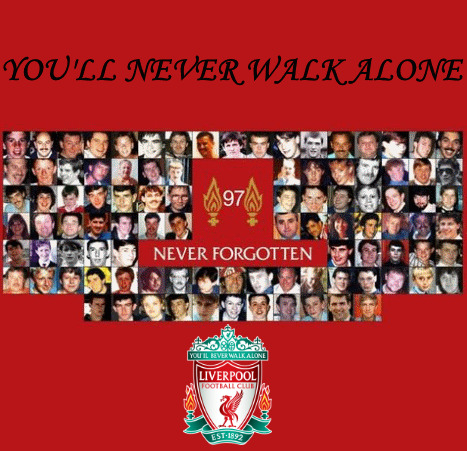
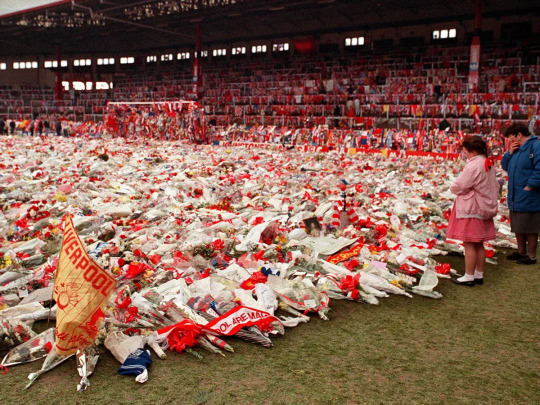
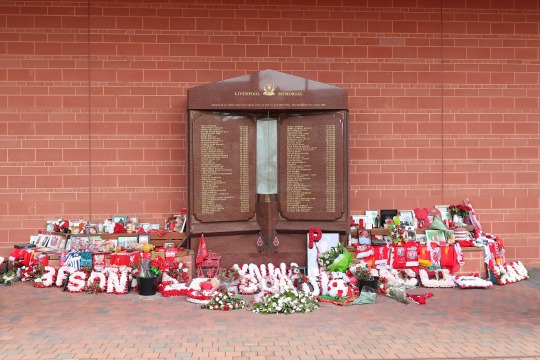
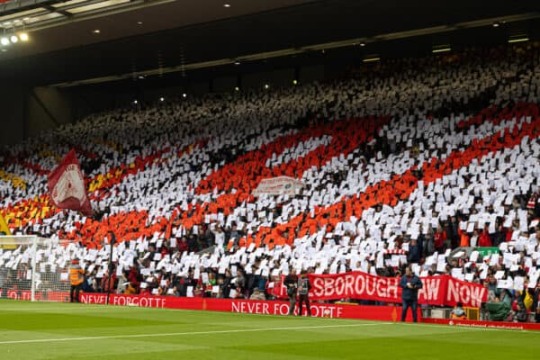
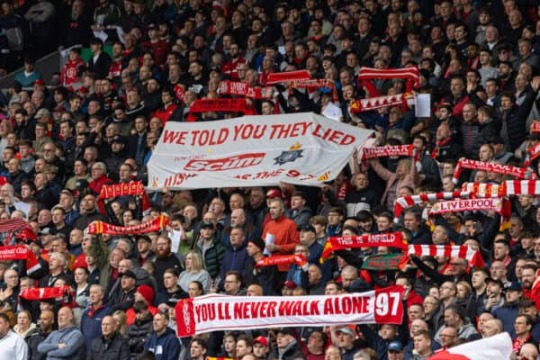
15.04.2023
47 notes
·
View notes
Text
Champions League final review: ‘It is remarkable that no one lost their life’
by Philip Buckingham
(this article shouldn’t placed behind a paywall, everyone should read this. Especially after Hillsborough how this can happen again. Prepare yourself for a long read)
It was the showpiece evening that brought European football uncomfortably close to tragedy.
The 2022 Champions League final between Liverpool and Real Madrid was meant to be a celebratory night but instead placed thousands of supporters in grave danger outside the Stade de France, near Paris.
“It is remarkable that no one lost their life.”
That was among the most sobering lines of a damning independent review that left European football’s governing body UEFA with nowhere to hide last night. Others, including local authorities and police, could not avoid criticism either, but the Champions League organisers were told the buck must stop with them.
“UEFA, as event owner, bears primary responsibility for failures which almost led to disaster,” concluded an exhaustive review spanning 220 pages, which drew on testimonies from key stakeholders and witnesses, including many fans, although Real Madrid chose not to cooperate.
It also drew comparisons with Hillsborough, saying many Liverpool survivors in the crowd in Paris were survivors of the 1989 disaster in which 97 people died.
“The parallels between Hillsborough 1989 and Paris 2022 are palpable,” said the report. “The similarities include the fact that both events were preventable, and both were caused by the failures of those responsible for public safety.”
Liverpool supporters were absolved of any blame.
Claims following the final had suggested thousands of fans had arrived without tickets to cause overcrowding and delays, but the review found they had been placed in danger owing to poor planning, a lack of communication and outdated policing methods.
The use of tear gas and pepper spray, predominantly on Liverpool fans, was also said to be “completely inappropriate as it was both life-threatening and disproportionate”.
Liverpool said the delayed six-month investigation, funded by UEFA and chaired by the Portuguese politician Tiago Brandao Rodrigues, “fully vindicates” the club’s supporters.
UEFA, meanwhile, said it will continue to analyse the review’s findings ahead of announcing a refund scheme for the affected.
What went wrong before kick-off on May 28?
“All the stakeholders interviewed… have agreed that this situation was a near-miss: a term used when an event almost turns into a mass fatality catastrophe.”
A night that eventually saw Real Madrid lift their 14th Champions League title with a 1-0 win over Liverpool was overshadowed by the traumatic events that unfolded outside the Stade de France ahead of kick-off.
The 80,000-capacity stadium had only been afforded three months to prepare after the original final hosts, Saint Petersburg, had the honour removed following Russia’s invasion of Ukraine in February of last year. The Stade de France had been considered the safe alternative by UEFA after it had hosted the 2016 European Championship final, but its suitability as the host venue was scrutinised.
The panel, which was made up of experts in policing, a barrister and representatives from fan organisations, concluded: “Two overarching organisational failures (were) at the root of what went so disastrously wrong in Paris.”
The UEFA model for organising the Champions League final was deemed “defective” after control of safety and security was passed on to other stakeholders, while the local authorities were also criticised for favouring a heavy-handed approach, “which was inappropriately based on incorrect assumptions that Liverpool FC supporters posed significant threats to public order”. That, the panel said, was an “inexplicable misconception”.
Concerns were first voiced in the middle of the afternoon, well in advance of the 9pm (local time) kick-off. An external security officer, appointed by UEFA, had told officials that arrangements were “not fit for purpose” at the Additional Security Perimeter entrance 3 (ASP3) that would later welcome Liverpool fans.
That initial ticket checkpoint was considered a known bottleneck, involving a ramp to the concourse where turnstiles were situated. The approaches to ASP3, involving an underpass known for overcrowding, were also considered problematic.
By 6pm, those fears were confirmed with heavy congestion and crushing in the area.
Just before 7pm, the stadium’s control room had accepted the area had become dangerous and asked police to divert fans arriving at the stadium to Additional Security Perimeter entrance 4 (ASP4), a far wider and more accessible point.
Police, though, were “slow to react”. “Thousands of supporters remained corralled in this unsafe environment, unable to progress or escape, as others unwittingly joined them at their rear,” said the report.
Compounding the rising sense of chaos, police and stewards then abandoned ASP3 75 minutes before kick-off. That allowed thousands of fans access to the raised turnstile perimeter, where problems had also been encountered with tickets at the gate. The decision was made for some turnstiles to be closed. “There was a clear and immediate danger of a fatal crush,” said the report.
Why was kick-off delayed?
The review offered a snapshot of the high-level discussions held within the stadium as the distress unfolded beyond perimeter fences. It is said Aleksander Ceferin, UEFA president, headed to a stairwell next to the VIP area to consider a delayed kick-off with senior executives. Ceferin had been meeting with the King of Spain, Felipe VI, and not “in the control room or engaging with commanders”.
Ceferin, whose only interaction with the review was a written statement dated November 23, said he had made the decision to delay kick-off “to make sure all fans will be in the stadium” and ignored the wishes of broadcasters to begin on time. The final would eventually kick off 36 minutes late.
Two messages were then put out on giant screens inside the ground: the first saying delays were down to a “security issue”, the second claiming it was due to the lateness of fans arriving.
Sharon Burkhalter-Lau, UEFA operations director, said the organisation only had access to two pre-prepared messages relating to a delayed kick-off owing to complexities involving translations — but it is made clear in the report that the two cited reasons projected inside the stadium were “objectively untrue” and “a crass error of judgment”.
What happened next?
If one aim of delaying kick-off had been to calm rising tensions outside, it failed to have the desired effect.
Police were criticised for the use of tear gas and pepper spray on “disorderly locals” and Liverpool fans attempting to gain access with valid tickets. The panel said this was “weaponry which has no place at a festival of football”.
Then, in the aftermath, came the finger-pointing. French ministers and UEFA claimed thousands of ticketless Liverpool fans attempting to access the stadium had been to blame. French sports minister Amelie Oudea-Castera said Liverpool supporters had been “let out in the wild”, interior minister Gerald Darmanin said two days afterwards that “industrial-scale fraud” had been noted, with 70 per cent of tickets coming into the Stade de France found to be fake.
No evidence, however, was found to support those assertions at any point of the investigation. Instead, the review rounded on those who attempted to shirk responsibility.
“It has been a feature of our investigations that several key stakeholders have not accepted responsibility for their own failures but have been quick to attribute blame to others. Some have continued to make allegations — in particular against supporters — based upon ‘facts’ for which there is no evidence,” it outlined.
Why did these problems occur?
It was accepted that a number of factors had contributed to the “near miss” of casualties, including the shortened preparation time as hosts, a hybrid model of electronic and paper tickets, a lack of experienced stewards and also the criminality of locals in the vicinity.
Ultimately, though, it was UEFA’s decision to delegate safety and security options to the French Football Federation (FFF) and Paris Prefecture de Police, the local force, that was found to be at the heart of a chaotic event.
“UEFA should have retained a monitoring and oversight role to ensure it all worked,” said the review. “It self-evidently did not… this represented an unacceptable abdication of responsibility by UEFA.”
It was concluded that UEFA had “marginalised” its own Safety and Security (S&S) Unit, headed by Ceferin’s close friend Zeljko Pavlica, thus removing a key mechanism in ensuring the final would go ahead smoothly. “Senior officials at the top of UEFA allowed this to happen,” it said. That resulted in poor communication and the absence of adequate engagement.
The decision to pass on security measures to local authorities and police were found to be deeply flawed. That, the review found, meant that a “model aimed at a non-existent threat from football hooligans” was adopted for the final with damaging consequences.
As far back as late March, long before Liverpool had qualified for the final, local stakeholders had made it clear that thousands of ticketless supporters would travel to Paris in the event of an English club getting that far and that it would be viewed as a threat to public order.
The tone had effectively been set, despite intelligence from the two clubs, Spanish and English police and UEFA that there had been no significant issues of football-related violence in recent years.
A “defective policing model” failed to ensure the safe mobility of fans in the last kilometre leading to the Stade de France; issues that were compounded by the absence of any effective contingency plans.
The panel found that eight factors contributed to the near tragedy. Among them were the poor signposting for Liverpool fans, which ultimately led to the bottleneck at ASP3, defective turnstile arrangements and the criminality of local youths, who were responsible for a large number of muggings and attacks close to the Stade de France.
It was said the police “did not have any effective plan to deal with anti-social behaviour or violence perpetrated by locals” and “stood by” as assaults took place.
Who did the panel think is to blame?
A number of stakeholders, including the FFF and local police, were found to carry “contributory fault” but the panel was clear in placing UEFA “at the wheel” of a disastrous event. The “primary responsibility” belonged to the body that had organised the event.
The delegation of security issues was known to have carried a heavy cost, with UEFA failing to oversee the safety of supporters at its own flagship event. UEFA could not possibly be absolved of responsibility, the report stressed.
“UEFA was central to the organisation of the event and it should have monitored, supervised and assisted with security and safety measures to ensure they were fit for purpose, and to identify and remedy problems before they arose in real-time.”
For all that UEFA’s faults in the event management were laid bare, their reaction before, during and after the final was also studied by the panel.
An initial statement on the night had included a line that problems were in part caused by ticketless locals but, at the request of local police, that was removed before publication. Instead, UEFA focused on the use of fake tickets as the greatest factor in the congestion and crushing. Even on June 8, 11 days after the final, the governing body continued to suggest ticketless fans had contributed to the disorder.
Chief executive of UEFA events Martin Kallen, meanwhile, is said to have given an account of events that was “seriously flawed and contained assertions that were objectively untrue” to an inquiry at the French senate in July. Kallen claimed he had been unaware of similar problems ahead of the 2016 French Cup final between Paris Saint-Germain and Marseilles or at the 2006 Champions League final between Barcelona and Arsenal.
The panel added that UEFA’s evidence was “striking in its orientation to protect itself, rather than to seek to ensure that nothing similar can happen in the future”.
Police methods on the night, both in central Paris and at the Stade de France, were criticised and there was also disappointment voiced by the panel that CCTV footage had not been available.
Footage from all 260 cameras around the Stade de France was auto-deleted about a week after the events. “The Stade de France management did not take any measures to ensure retention and no one else — including the French authorities, UEFA or FFF — asked them to retain the footage,” the panel said.
The review did not apportion any blame to Real Madrid, who won the final thanks to Vinicius Junior’s goal, but unlike Liverpool, the Spanish club declined to assist in the voluntary process. They were the only stakeholder “which declined to assist… for reasons of its own”.
Why was Hillsborough referenced repeatedly in planning for the event?
Ninety-seven people lost their lives attending the 1989 FA Cup semi-final between Liverpool and Nottingham Forest and a long fight for justice is still to see anyone held accountable for those unlawful killings.
Attempts were made by South Yorkshire Police to vilify Liverpool fans after a section of the terrace at the Leppings Lane end at Hillsborough, Sheffield Wednesday’s ground, became overcrowded, with untrue claims of ticketless, drunken supporters forcing entry later disproved.
“The parallels between Hillsborough 1989 and Paris 2022 are palpable,” said the review. “The similarities include the fact both events were preventable, and both were caused by the failures of those responsible for public safety.
“Both events were foreseeable. In the judgment of the panel, the different outcomes were a matter of chance: in one nearly a hundred died, the other none, but through no merit of those in charge.”
The echoes of history were there with authorities and the establishment attempting to shift blame onto those without a voice. The review highlighted that several senior figures have continued to make baseless allegations, particularly against fans, despite the absence of established facts.
The tragic events at Hillsborough had taken place 33 years before the Champions League yet, inexplicably, were mentioned in planning for Liverpool’s trip to the French capital.
The Inter-ministerial Delegate for Major Sporting Events (DIGES) decided the Hillsborough disaster helped design “strong police build-up to maintain order” to counter the potential threat of hooliganism. England’s game against Russia in Euro 2016, a fixture marred by violence in Marseilles, was also cited.
“Absolute outrage. Outrage,” was Liverpool’s response in the review. “They’ve conflated hooliganism with Hillsborough, and we don’t need to revisit that path. It’s such a calamitous error of judgment, it beggars belief. Absolutely beggars belief.
“We’ve reiterated (on) a number of occasions the profile of our football fan is they will come, they will celebrate their team, they will support their team, they will enjoy your city, and they will go home. It can’t be any simpler than that. So, that as planning assumption, it’s absolutely outrageous. That was never challenged at the start and never was it ever discussed with us.”
A “prejudicial misconception” was considered a “remarkable failure” by the Prefecture de Police.
“The Panel has concluded, without hesitation, that referencing Hillsborough with respect to the policing approach was an appalling error, which should not have been made. In addition, this error was amplified by publishing messages blaming ‘late’ supporters for the delayed kick-off, which was not only untrue but was obviously going to offend and traumatise Liverpool FC supporters.
“UEFA senior managers should have understood the way the message would resonate with well-known issues surrounding the Hillsborough disaster and subsequent cover-up. Many survivors from Hillsborough were at the Paris events.”
What happens now?
The independent review concluded with 21 recommendations, saying that public safety at major sporting events is “too important to pass up the opportunity” of learning lessons.
Among those were the directives that UEFA should be directly and more fully involved in the planning of major events — both inside stadiums and their surrounding areas — and insist upon “customer-service stewards” being deployed.
UEFA were told they “must not just move on” from the Paris findings and that travelling fans should never be viewed as an inherent public-order problem. Changing perceptions of supporters and placing them at the heart of plans was also a point pressed home.
UEFA’s own statement in reaction to the review accepted it would “introduce appropriate changes and arrangements to ensure the highest level of safety for fans at future finals”.
Theodore Theodoridis, UEFA General Secretary, was given the task of offering comment, rather than Ceferin.
He said: “UEFA is committed to learning from the events of 28 May and will cooperate closely with supporters’ groups, the finalist clubs, the host associations and local authorities in order to deliver outstanding finals where everyone can enjoy the game in a safe, secure and welcoming environment.”
The report added its concerns that there was an acute need to address the problems outlined ahead of Paris playing host to the rugby union World Cup later this year and the Olympic Games in 2024. The Stade de France is due to host key events at both.
#also noted that Real didn't cooperate on this investigastion for god's knows why#liverpool fc#lfc#JFT97#UCL final 21/22#Liverpool vs Real Madrid
40 notes
·
View notes
Text

The 35th anniversary of the Hillsborough disaster.
We will always be a voice for the victims, we will never let them be forgotten!! My thoughts are with the victims families and friends on this terrible day.
Justice for the 97.
35 notes
·
View notes
Text
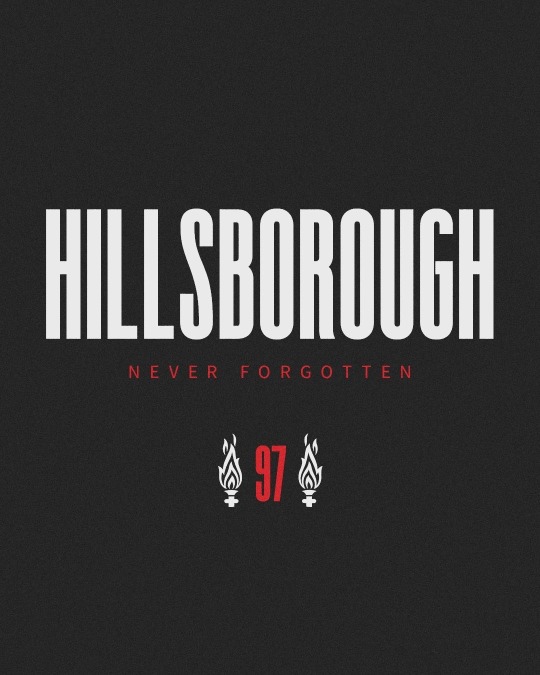
No one should ever go to a game and never come home. A game we all love and adore!
Today, the football world should come together and pay its respects regardless of who you support.
3 notes
·
View notes
Text

on the 34th anniversary of the Hillsborough Disaster, we sit and remember the supporters who never returned home.
this day hurts my heart every year ☹️
You’ll Never Walk Alone ❤️
17 notes
·
View notes
Text
Fulham were in town playing Everton today. In the morning, Marco Silva, Tom Cairney, and Tim Ream visited the Hillsborough memorial at Anfield and paid their respects. Class gesture, thank you.
8 notes
·
View notes
